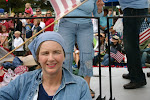Book Review: One Nation Under Sex
Sex and McCarthyism: America’s GLBT Witch-Hunt
Book Review: One Nation Under Sex by Larry Flynt and David Eisenbach
by Lyn JensenRepublicans have been using homosexuality as a political football only since the McCarthy era, so argue Larry Flynt and David Eisenbach in their recent book, One Nation Under Sex.
“We really do believe there is an all-powerful force which shaped our nation. That force is sex,” the authors declare in their introduction, and proceed to lead readers through a history of America as viewed through its major sex scandals.
In the nineteenth century the possibility of a politician being anything other than heterosexual was not a bar to obtaining high office, demonstrated by several examples of early presidents and vice-presidents. Flynt and Eisenbach carefully document their assertion that “James Buchanan, the only bachelor president, fell in love with Alabama politician William Rufus King, the only bachelor vice-president” (although they did not serve at the same time).
Andrew Jackson called them “Aunt Fancy” and “Miss Nancy,” common nineteenth-century terms indicating gay men. Aaron Brown, a governor of Tennessee, referred to them as “Buchanan and his wife.”
After Buchanan became president, his niece and King’s niece tried to cover the relationship by burning the men’s letters but, as the authors point out, “fortunately they missed a couple, and they are very revealing.”
As to why the relationship was never exposed for others’ political gain, the writers suggest that in the nineteenth century such relationships were “unspeakable” and “unprintable.” This must be only part of it, however, for obviously many powerful men were aware of Buchanan’s private life but allowed him to become president. Lincoln also showed evidence of being what the authors describe as “sexually complicated.”
Only during the Red Scare of the 1950’s did Joseph McCarthy and the Republican party turn gays into as much of a perceived “national security threat” as Communists. J. Edgar Hoover, with his secret FBI files, also did his part to make homosexuality the wedge issue in American politics that it remains to this day. The irony and tragedy is that McCarthy and Hoover were most likely closet cases, politicizing the issue to turn attention away from themselves.
Nation describes how Eisenhower, a Republican, signed a law that made “sexual perversion” a bar to federal service, and how, during the Cold War, the State Department fired many more homosexuals than Communists. Well into the 1960’s the department made yearly appearances before Congress to reveal how many homosexuals it fired, somehow using it to justify appropriations.
“After all, there were few Communists in government but there were plenty of homosexuals,” the authors note. The McCarthy era may be over, but Republican extremists are still inflicting a McCarthy-like witch-hunt upon the GLBT community.


0 Comments:
Post a Comment
Subscribe to Post Comments [Atom]
<< Home